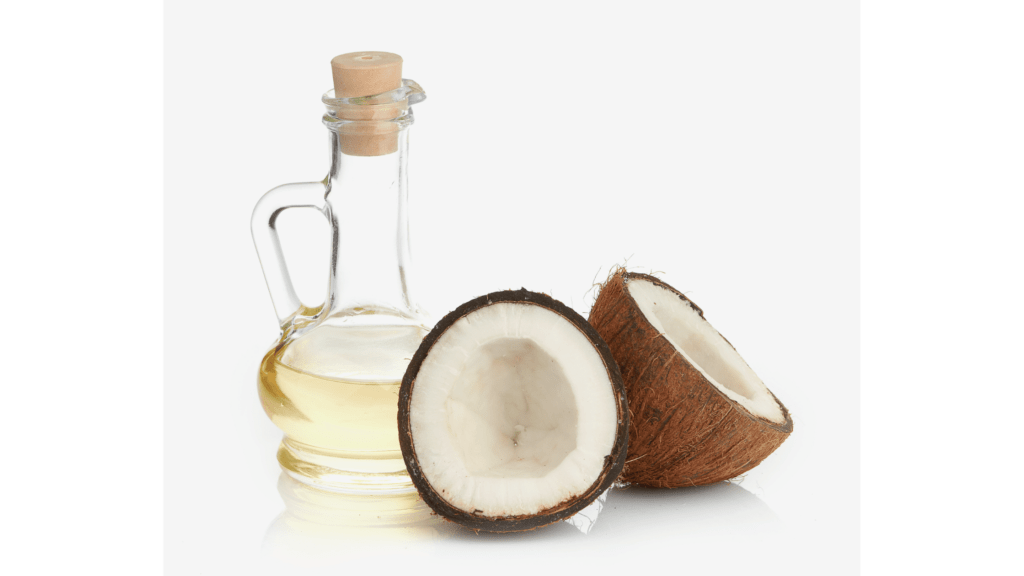Coconut oil offers some benefits for dogs, particularly when alleviating hot spots and relieving itching. Its natural antimicrobial and moisturizing properties make it a promising option for specific skin issues. However, like any remedy, coconut oil should be used cautiously and moderately, especially if your dog has no particular skin concerns.
As avid pet lovers, we understand how important it is to ensure the well-being of our beloved furry friends. Regarding natural remedies for common canine concerns, coconut oil has been gaining popularity as a potential solution for various dog issues, including hot spots, itching, and even a natural antibiotic.
In this comprehensive guide, we’ll delve into the world of coconut oil for dogs and explore whether it can relieve these everyday ailments.

1. What Are Hot Spots in Dogs?
Hot spots, also known as acute moist dermatitis, are red, moist, and irritated areas on a dog’s skin. These spots can be incredibly uncomfortable for our canine companions, leading them to incessantly itch, lick, and scratch the affected areas. Hot spots can arise due to various factors, such as allergies, insect bites, or underlying skin conditions.
2. Does coconut oil help dogs hot spots?
Coconut oil contains medium-chain fatty acids, specifically lauric acid, which has natural antibacterial and antifungal properties. When applied topically, coconut oil may create a protective barrier over the hot spots, preventing further irritation and infection. Moreover, coconut oil’s moisturizing qualities can soothe inflamed skin, relieving itching and discomfort.

3. Can I Rub Coconut Oil on My Dog Daily?
While coconut oil can benefit dogs when appropriately used, it’s essential to exercise moderation. Daily utilization of coconut oil might not be necessary, especially if your dog does not have any skin issues. Over-Usage can lead to excessive oiliness, attracting dirt and dust and exacerbating specific skin problems.
4. Is It OK for Dogs to Lick Coconut Oil?
Coconut oil is generally safe for dogs to consume in small amounts. In fact, many dogs find the taste of coconut oil quite palatable.
However, if your dog has a habit of excessively licking or ingesting coconut oil, it could lead to gastrointestinal upset, including diarrhea and vomiting. Therefore, monitoring their intake and consult your veterinarian if you have any concerns is best.
5. What are the side effects of coconut oil for dogs?
While coconut oil is generally safe, some dogs may be sensitive or allergic to it. Signs of a coconut oil allergy may include itching, redness, swelling, or hives. If you notice any adverse reactions after applying coconut oil, discontinue use immediately and seek veterinary advice.
6. Does coconut oil help with fleas?
While coconut oil has been praised by some as a natural flea repellent, its efficacy in controlling flea infestations is not scientifically proven. If your dog has a flea problem, it’s crucial to consult your veterinarian for appropriate flea control measures.
Relying solely on coconut oil may not effectively eradicate the fleas and protect your dog from potential health risks associated with these pesky parasites.
7. Is Coconut Oil Better Than Olive Oil for Dogs?
Both coconut oil and olive oil have potential health benefits for dogs. Coconut oil’s lauric acid content may provide unique advantages, such as its antimicrobial properties.
On the other hand, olive oil is rich in monounsaturated fats, promoting heart health and aiding digestion. The choice between the two will largely depend on your dog’s needs and health conditions.

8. Can I put coconut oil on my dog after a bath?
Applying coconut oil on your dog after a bath can be a great way to lock in moisture and nourish their skin and coat. Bathing can sometimes strip the skin of natural oils, leading to dryness and irritation. A light application of coconut oil post-bath can help replenish the skin’s moisture and promote a healthy, shiny coat.
Remember, moderation is critical to avoid any potential adverse reactions.
9. Can I Spray Coconut Oil on My Dog?
While some commercial coconut oil sprays for dogs are available, using them cautiously is essential. Aerosolized sprays might contain other ingredients that can harm your dog when inhaled or ingested. If you prefer a spray application, look for a product specifically formulated for dogs and free from harmful additives.
10. How do you wash coconut oil off a dog?
To wash coconut oil off your dog, follow these steps:
- Gently brush your dog’s coat to remove any excess oil and debris.
- Prepare warm water in a bathtub or basin.
- Use a dog-friendly shampoo to create a lather and wash your dog thoroughly, paying extra attention to areas with coconut oil residue.
- Rinse your dog’s coat thoroughly to ensure all the shampoo and coconut oil are washed away.
- Towel dry your dog and allow them to air dry completely.
11. Can Dogs Be Allergic to Coconut Oil?
Yes, some dogs can be allergic to coconut oil, just as they can be allergic to various other substances. Signs of an allergic reaction may include itching, redness, swelling, hives, or gastrointestinal disturbances. If you suspect your dog is allergic to coconut oil, discontinue use immediately and seek veterinary advice.

